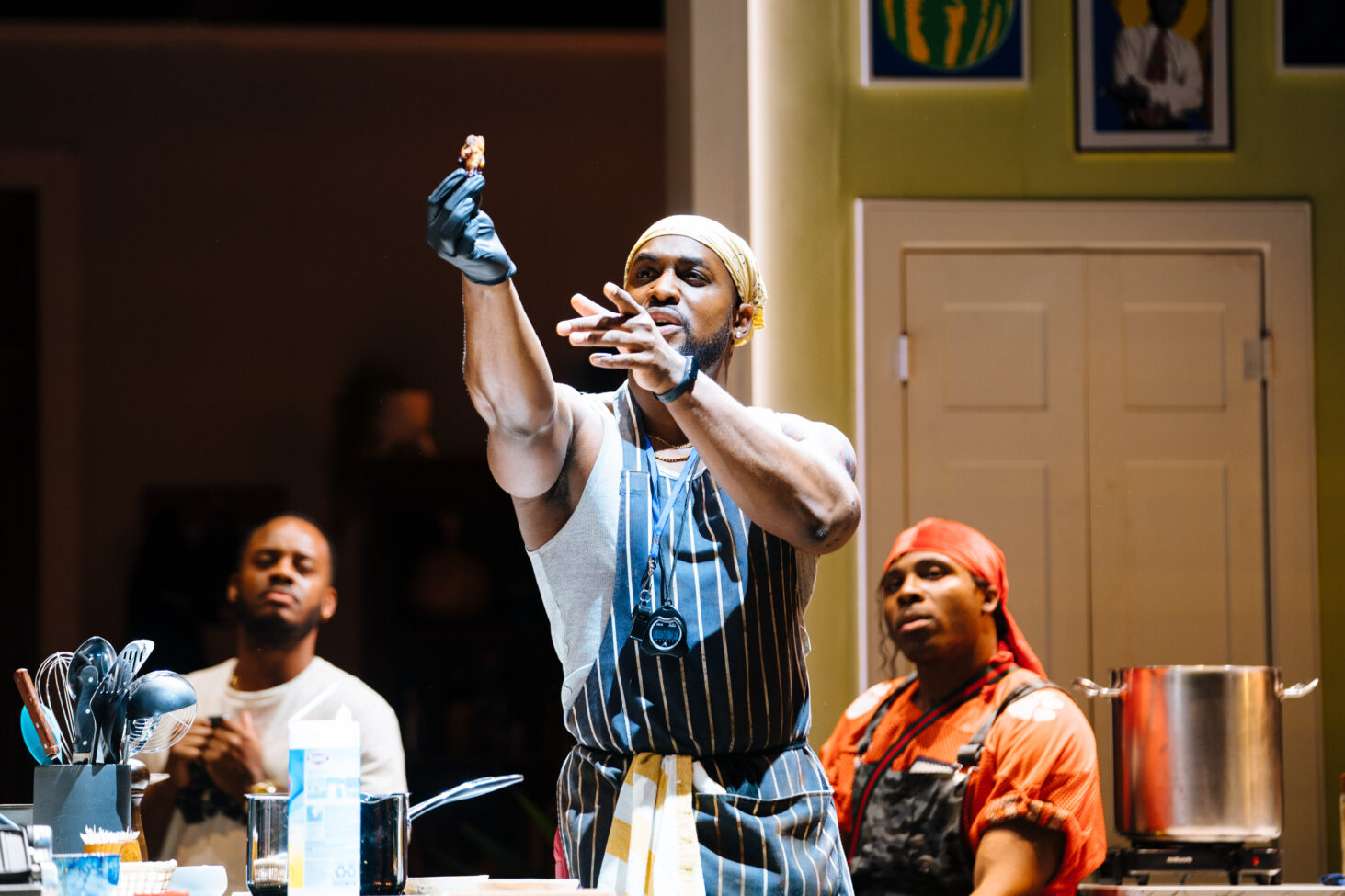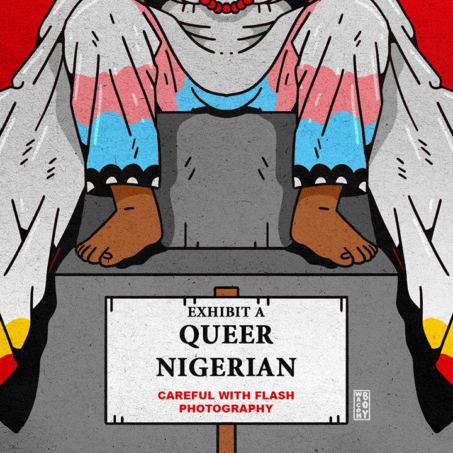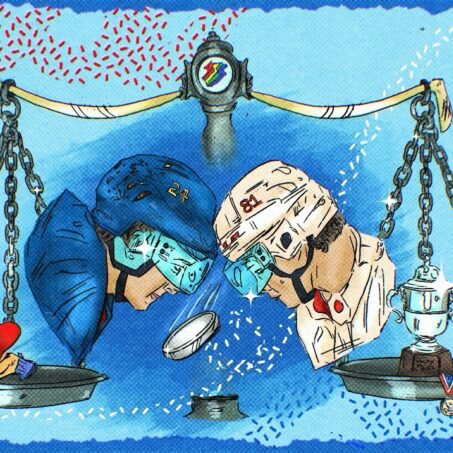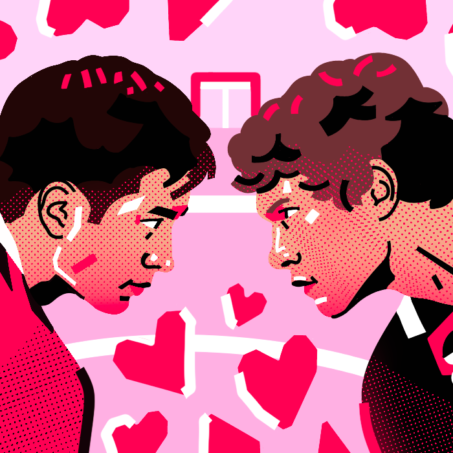In the 2021 Pulitzer Prize winning play, The Hot Wing King, Cordell (Kadiff Kirwan) opens up about his fears of failure — in his career, as a husband, and as a father — to his partner Dwayne (Simon-Anthony Rhoden). In this moment, Dwayne reminds Cordell that love is always the goal, not necessarily being a perfect husband or father. This moment sets the stage for the play’s themes – exploring love, masculinity, grace, and community.
The comedy-drama, written by Katori Hall and directed by Roy Alexander Weise, is anchored by the couple and their friends, Isom (Olisa Odele) and Big Charles (Jason Barnett), as they gear up for an annual “Hot Wing Festival” in Memphis, Tennessee. Cordell, an out-of-work chef who left his 20 year marriage and now lives with Dwayne, is determined to win the $5000 cash prize.

I went into The Hot Wing King at the Dorfman Theatre with zero expectations. I had been attacked with ads about the show almost every time I was on Instagram, but I did not stop to reflect on why I would be regarded as a target audience. It looked interesting from what I had noticed, but I thought I had a few more weeks to skip the ads before seriously considering seeing it. So, although I did say I would be more of a theatre babe this year, I went on with my life.
A few weeks before the show closed, a friend had gone to see it and had good things to say about it, including the “plot” (by which they admitted they meant Kadiff Kirwan). I was convinced to go see it, and after aligning our schedules and finding a suitable date, the only option we had were nosebleed seats with restricted views on Friday the 13th – a day before the show ended. Still, I was sat, ready to have a good time.
The play doesn’t just tell a love story; it explores what it means to love and be loved and pushes the boundaries of identity, masculinity, and belonging. It confronts men’s vulnerabilities and how masculinity is shaped, challenged, and sometimes undone. The characters are not framed as archetypes of the masculine experience but as fully realised, flawed people navigating the complex spaces of love and societal expectations.
Perhaps the play resonated with me because these are things I am working through. As I have navigated the genuinely fascinating field of dating while queer, I have had to reconfigure my attachments to ideas of masculinity, vulnerability, and the meanings of love, grace, and joy in relationships.
Gay men and heterosexual marriages
A few years ago, I came across a discussion on Twitter among people who heavily positioned themselves as “feminist” — women and gay men alike. The discussion was about how gay men marry “unsuspecting” women instead of “being themselves” and “coming out.” As the conversation spiralled into homophobic, sexist and reductive takes, I couldn’t help but be frustrated with how little grace we afford ourselves when having these conversations.
The tweets argued that gay men were trapping women in loveless marriages, using them as shields against homophobia, thus jeopardising the women’s chances of finding true love. While it’s important to hold men accountable for how they navigate themselves within a patriarchal society, it’s reductive, even absurd, to assume that this is always what’s happening when we see a gay man in a heterosexual marriage.
This is a complex problem that requires its own article, but the short of it is that these conversations must acknowledge the broader societal forces that shape how people navigate their lives, such as laws, sociocultural values, and religious practices that perpetuate traditional family structures and mandate marriage. There are multiple layers of influence at play, and simplifying the discussion to allocate blame and create a villain that supposedly “hates women” does no justice to its complexity.
Moreover, framing the argument in such a narrow way is not only reductive but also sexist AND homophobic. Why do we automatically assume the women are straight or “unsuspecting”? Just because a man’s sexual orientation might be an open secret or subject to speculation based on how they (do not) perform masculinity, why is the default assumption that these women are victims without agency or self-determination?
It is important not to allocate blame to a specific individual, but understand how we are forced to negotiate the sociocultural complexities that have enabled these dynamics. We are all victims and perpetrators – none of us are individually exonerated, and, therefore, none of us are to be individually blamed.
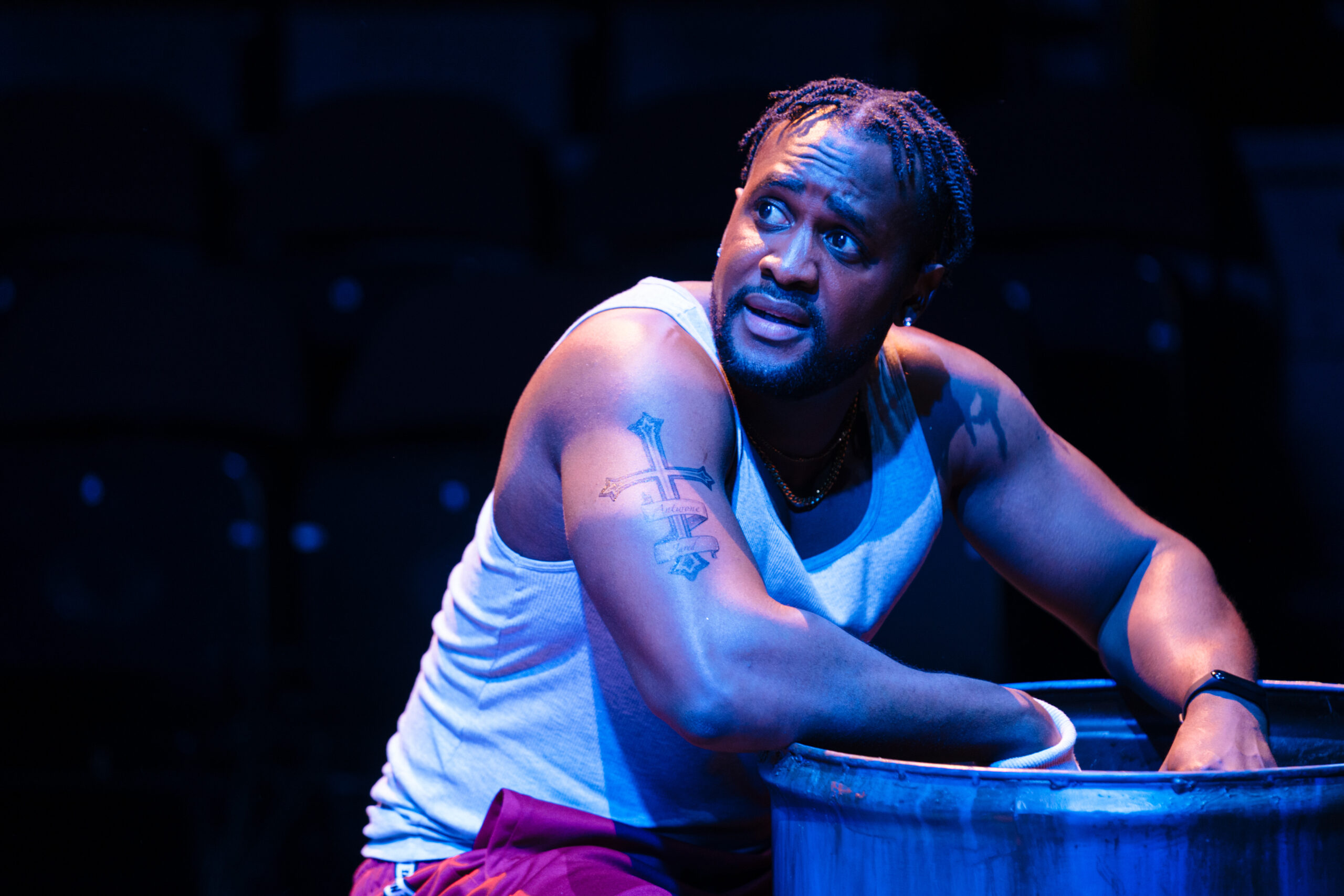
In The Hot Wing King, Cordell, married to a woman for 20 years before meeting Dwayne, embodies this rarely explored dynamic with grace. While he doesn’t explicitly identify as gay to the audience, we know he leaves his marriage to his wife to be with a man. He isn’t let off the hook for the chaos this decision causes, but the play explores the conditions that led to it.
Cordell is not painted as a villain to the audience, even though it is clear that his ex-wife and sons see him that way. Instead, the audience is invited to humanise him. The play offers a nuanced and empathetic portrayal of a man negotiating his identity within his various relationships and society’s expectations. There’s no simple resolution in the play, but there is grace.
When it comes to coming out, we’re often presented with binary narratives: either the person is a hero for embracing their “truth” or a victim of societal constraints. This play defies that binary. Cordell’s journey isn’t about being “trapped in” or “escaping” heteronormativity. He is also not living his best life in the situation he has ended up in with Dwayne. It’s about understanding how choosing love (of self and another), even in a context (and with history) that doesn’t fit societal norms and expectations, can still hold deep meaning.
Love and dysfunction
There’s a raw honesty in the portrayal of Cordell and Dwayne’s love. We see it as one where love, resentment, affection and dysfunction coexist. Cordell, in leaving his marriage, might have found new freedom, but the play never lets us forget the emotional price of such liberation and the consequences of that in how he sees himself.
Cordell’s journey from being the husband, father, and provider, to feeling dependent on Dwayne because of his unemployment, is central to his inner conflict. The role reversal unsettles him, and he resents not only himself and his situation but also Dwayne. Whether or not Dwayne intentionally makes him feel inferior, Cordell’s perception drives the tension between them.

His love for Dwayne, while genuine, is clouded by the bitterness of what he’s lost. Their interactions reveal that love is rarely uncomplicated – it’s weighed down by past experiences and insecurities. At times, Cordell speaks as if Dwayne is controlling and infantilising.
From the outside, it’s easy to see how he reaches this conclusion. But when we learn about Dwayne’s history with his sister, it becomes clear that this story is more about Cordell’s insecurities. It is more about his reluctance to vulnerability, than it is about reality.
Cordell’s feelings, while valid, don’t always reflect the truth. His insecurities distort his view, turning love into something strained by misunderstanding. This part of the play made me reflect deeply on how love is shaped by our own struggles and how we can sometimes misinterpret the actions of those closest to us.
My evolving idea of love
Over the years, my understanding of love has shifted and unravelled in unexpected ways. Typically, this is the point I offer a theoretical take on love – perhaps drawing on the wisdom of bell hooks. But instead, I would like to discuss how I’ve come to experience love.

Join our mailing list
Sign up for shado's picks of the week! Dropping in your inbox every Friday, we share news from inside shado + out, plus job listings, event recommendations and actions ✊
Sign up for shado's picks of the week! Dropping in your inbox every Friday, we share news from inside shado + out, plus job listings, event recommendations and actions ✊
A way I have grown to see love recently is not particularly new, but it is the idea that love is the act of giving someone the power to break your heart and hoping and trusting that they don’t. With love, there is a dynamic exchange of power. When we choose to do right by someone we claim to love, we defer that power. This isn’t confined to romantic relationships; it applies to all kinds of connections.
Heartbreak and suffering are inevitable in this dynamic. In a space where there is love, when we offer that power, we receive it – creating a mutual exchange. Given the complexity of life and sociocultural power dynamics caused by gender, race, class and so on, we will use that power repeatedly. Love is staying within that exchange despite the heartbreaks and suffering that come – past, present, and future.
Let’s be clear: this is not a justification for staying in an abusive relationship. In those situations, there isn’t an equal dynamic exchange of power. One person is vulnerable to having their heart broken, while the other exploits that. That’s not love. Love and abuse cannot coexist (I guess bell hooks had to show up, after all).
Love requires mutual and dynamic exchange. It is not the one-sided situationship that leaves you broken beyond repair. Love is about seeing a way forward together – and sometimes, that means knowing when to leave.
This is how I understood the love between Cordell and Dwayne. They hurt each other throughout the play, breaking one another’s hearts. But they remain within that mutual exchange, recognising it isn’t one-sided. Both are engaged, giving and receiving the power to wound, yet staying in the fight together.
I’d like to imagine they stay together forever, though I can just as easily picture a scenario where they don’t. What matters most is that, right now, with everything we see, they are in it together.
And honestly, I want that.
On fatherhood and homophobia
The play also explores the complexities of fatherhood, toxic masculinity, and homophobia. One easily overlooked character is TJ (Dwane Walcott). TJ is EJ’s (Kaireece Denton) father, and EJ is Dwayne’s nephew. EJ, having moved from place to place after his mother’s death, is under the influence of TJ, a drug dealer struggling to care for his son and steering him into a supposedly dangerous lifestyle.
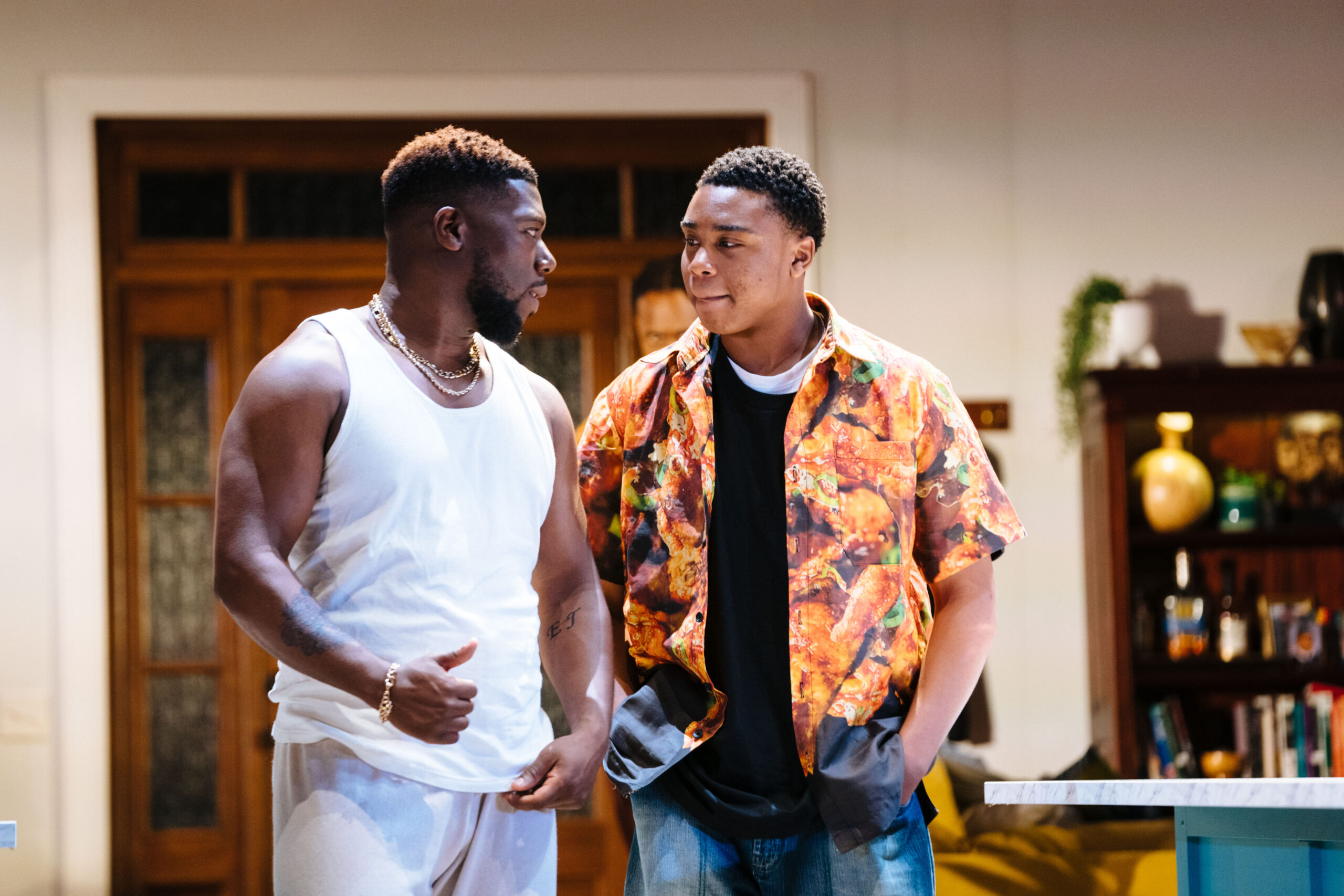
Fatherhood is portrayed through TJ’s character with emotional depth, vulnerability, and a sense of community. The play challenges conventional ideas of fatherhood, particularly in a moment where TJ asks: “Do you think I’m a good father?” and receives the reply: “You try, but you can’t be a good father on your own.” This exchange speaks to the fact that fatherhood isn’t a solitary act; it “takes a village” to raise a child. It emphasises the importance of community and shared responsibility rather than placing the full weight on one person.
The play also navigates the tension between fathers and sons, and how expectations and insecurities shape these relationships. It shows how fathers, particularly those wrestling with their own sense of masculinity, may struggle to connect with their children.
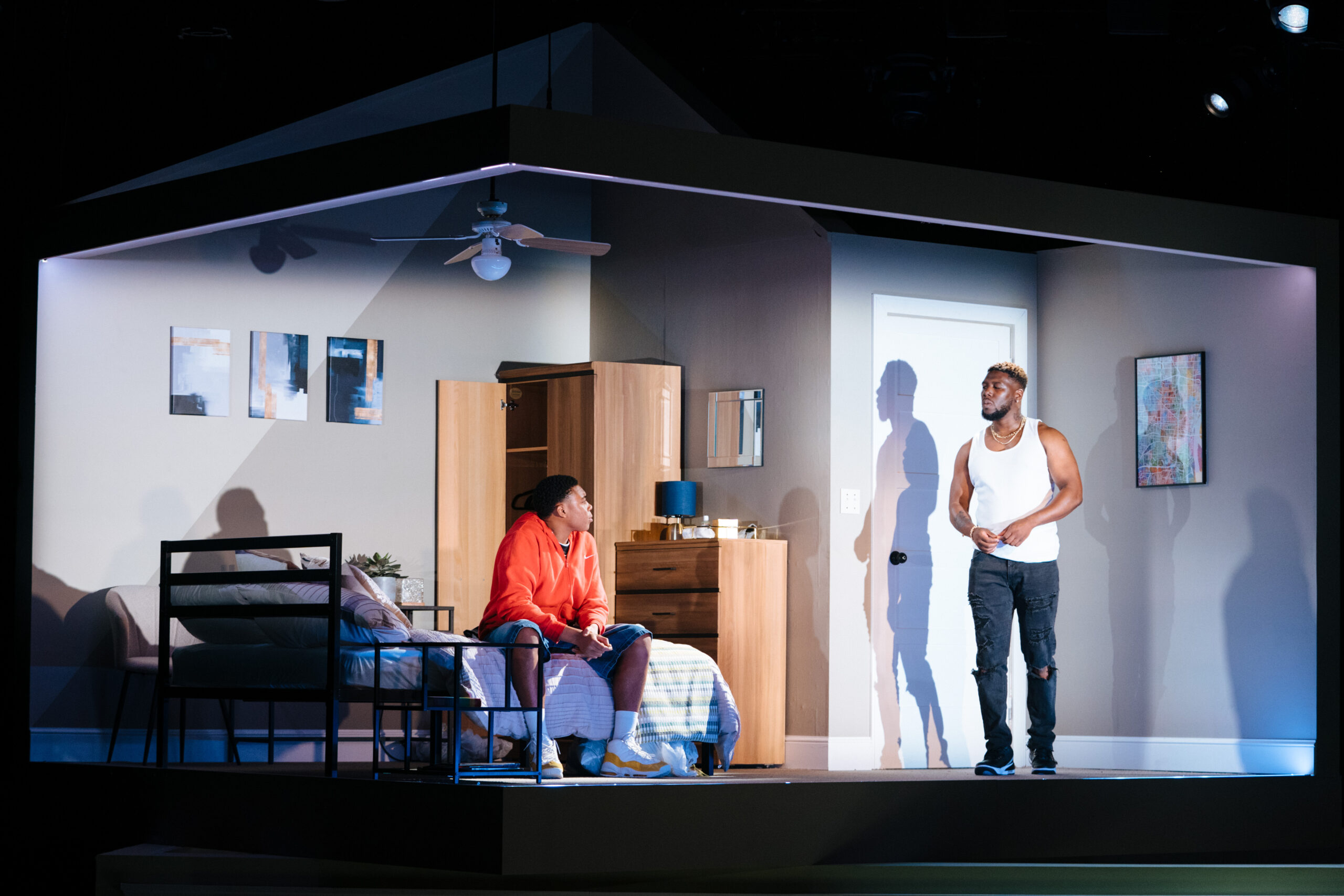
TJ, for example, is not vilified for his life choices and his involvement with drugs and gangs. He is depicted as someone grappling with his reality while genuinely trying to navigate his relationship with his son. This nuanced portrayal avoids simple binaries of “good” or “bad” fathers, instead revealing the emotional complexity and growth that comes with parenting.
A significant moment for me was when TJ expressed homophobic remarks towards Dwayne and his friends. At this point, he positions himself fully as antagonistic to the queer people we have grown to love till this point.
However, instead of devolving into a predictable conflict, where someone triumphs over TJ in a fist fight to show the strength of queer people, the scene plays out into a masterful reflection of how queer people often have to navigate prejudice. It’s not always about physical confrontation; instead, the queer characters, aware of their position in the social hierarchy, opt to outsmart TJ by simply challenging his idea of masculinity, and showing that even he cannot meet those standards. It’s a quiet rebellion rarely seen in mainstream portrayals of masculinity and queerness.
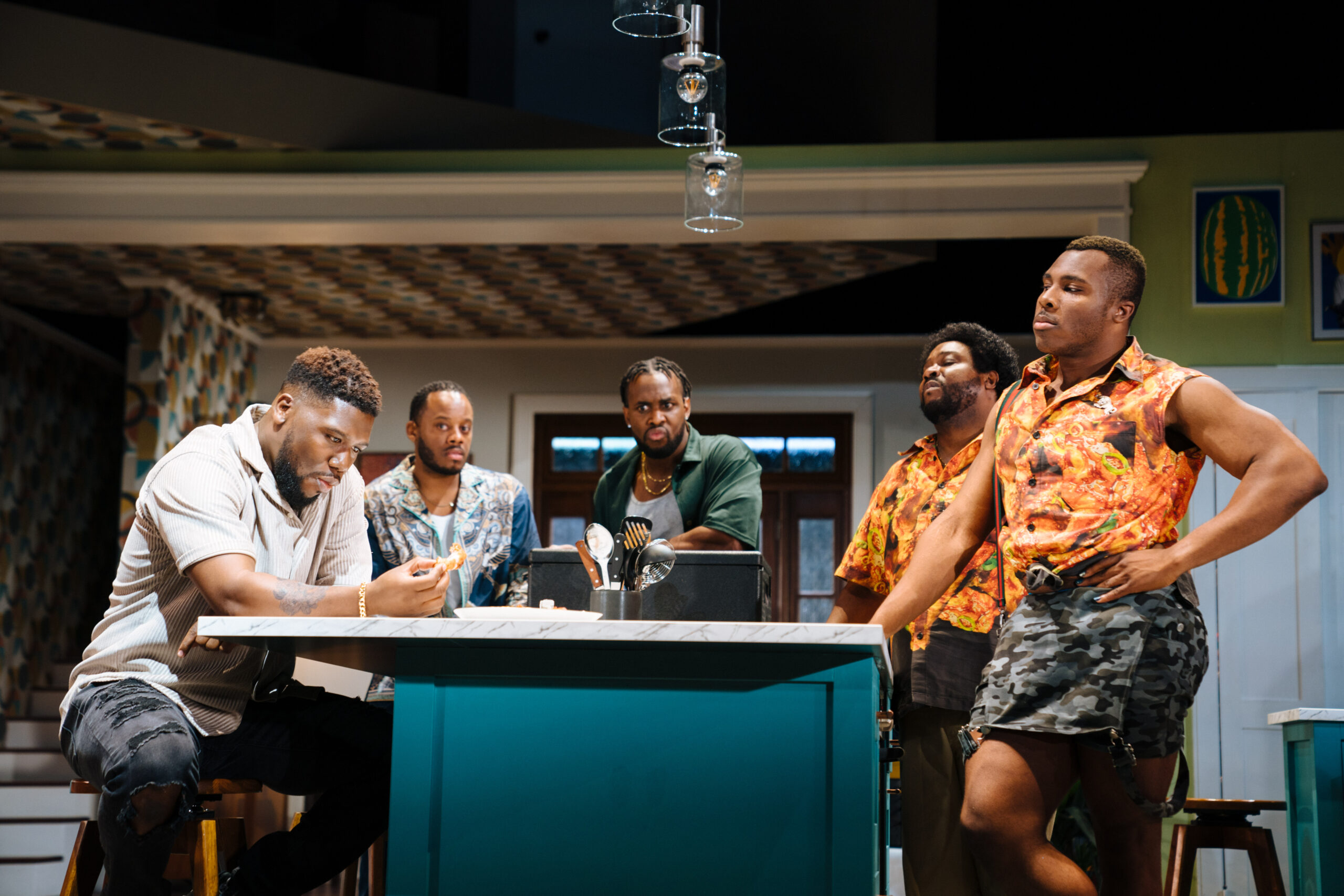
TJ doesn’t suddenly accept queerness, but he begins to see the queer characters as human through an unexpected shared value – what’s best for EJ. Hilariously, this connection is sparked by his admiration for their sense of style and clothes. We witness him warm up, not to their sexual orientations, but to them as people, treating them with a newfound respect.
The play doesn’t offer us a villain to boo or cheer against. Instead, it gives us a nuanced depiction of a man shaped by his biases, and the way he, too, is humanised. It’s easy to write off someone who doesn’t share our worldview, but the play’s brilliance lies in its refusal to demonise anyone. Instead, we see men – queer and straight – grappling with the limitations of their upbringing and the possibilities of who they might become.
Women
When I found out a Black woman wrote the play, it made sense to me. Women are notably absent as physical characters, but their presence is felt and tied into the narrative with some degree of reverence, complexity, and nuance. While the play primarily centres on the experiences of Black men and masculinity, the role of women is crucial in shaping the emotional beats of the story.
One of the most significant ways women are portrayed is through EJ’s mother (also Dwayne’s sister and TJ’s ex), who struggled with mental health issues and lost her life to police violence.
Even in her absence, she is revered and remembered with awe. She is not portrayed as a perfect being either. She is shown as human with flaws, and discussed with grace and compassion. Her death speaks to the broader social commentary the play offers, touching on police brutality, the ways Black women experience systemic violence, and how they shape Black masculinity. This was a first for me in a play that centres Black men.
Of course, the play wasn’t without flaws, and a few moments didn’t sit well with me. Cordell’s bluntness was sometimes played off as a joke, with remarks about him being “on the spectrum” played out for laughs, but without offering any real reflection on what that meant. In one particular moment, they tell a story where Cordell’s attitude leads to him essentially outing another queer person, and this made me feel uncomfortable. While it fits his character, I felt there should have been some recognition that this wasn’t the sharp retort it seemed to be played for.
Another missed opportunity was with Isom’s character, who was the more conventionally femme character of the bunch. They briefly mention how people like them are only loved once, but this idea isn’t really explored. It would have been interesting to explore how more femme queer men navigate their experiences within the queer community, but this thread was left hanging.
That said, none of these detracted from my overall enjoyment.
On a complex love
Seeing the love on stage made me long for it. Not just the romantic kind – though I’m coming to terms with wanting that too – but the love of community, one’s craft, and self-love. It was the kind that comes with dysfunction and chaos.
I found myself both frustrated and pulled in by the characters. Their decisions and words often angered me, yet moments later, I’d smile and be reminded why I cared so much about them. It felt like a mirror of my relationships with friends and family – messy, chaotic, but deeply fulfilling.
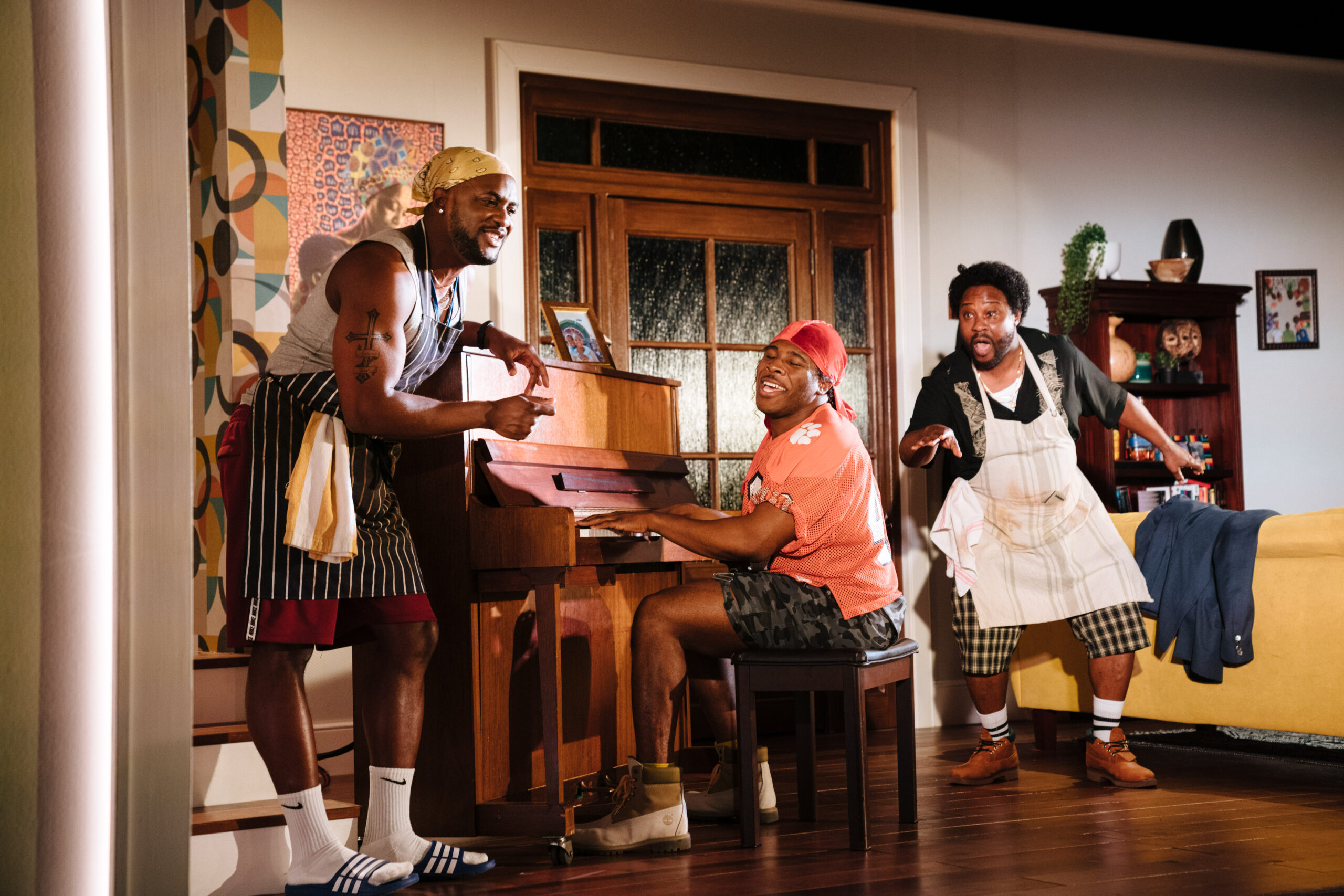
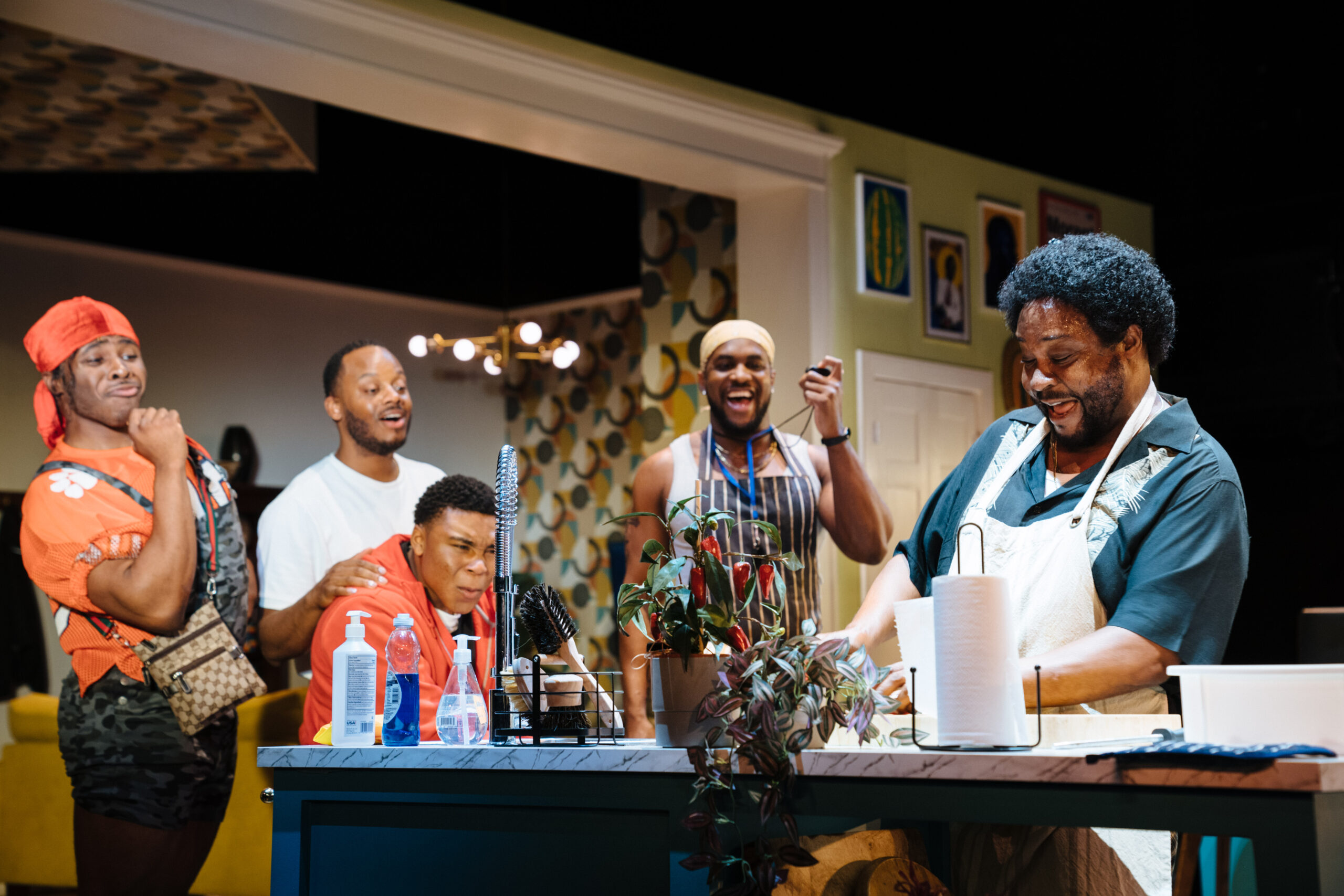
At the heart of the play is the truth that love, whether between friends, lovers, or a community, is never simple. In a world where we are often asked to simplify, categorise, and choose sides, it is refreshing to experience a story that embraces that complexity. It reminded me of another play I enjoyed watching recently, Shifters (I really hope that ending didn’t mean Des came back. Free yourself, babe! IYKYK). These plays ask us to sit with tensions, to accept that love can be both beautiful and painful, and that masculinity can be both a refuge and a prison. It is a story about the messy, contradictory, and intense nature of being human.
I wish I had seen it earlier so I could have written this article sooner to encourage more people to go. And perhaps so I could have experienced it again. The takeaway? Don’t ignore those Instagram ads. The algorithm might know you better than you think.
What can you do?
- Read Nearly All the Men in Lagos are Mad by Damilare Kuku, specifically the chapter “Beard Gang”
- Watch Noah’s Arc
- Watch The Skinny
- Watch Punks
- Read All About Love by bell hooks
- Read more pieces by Adebayo HERE

